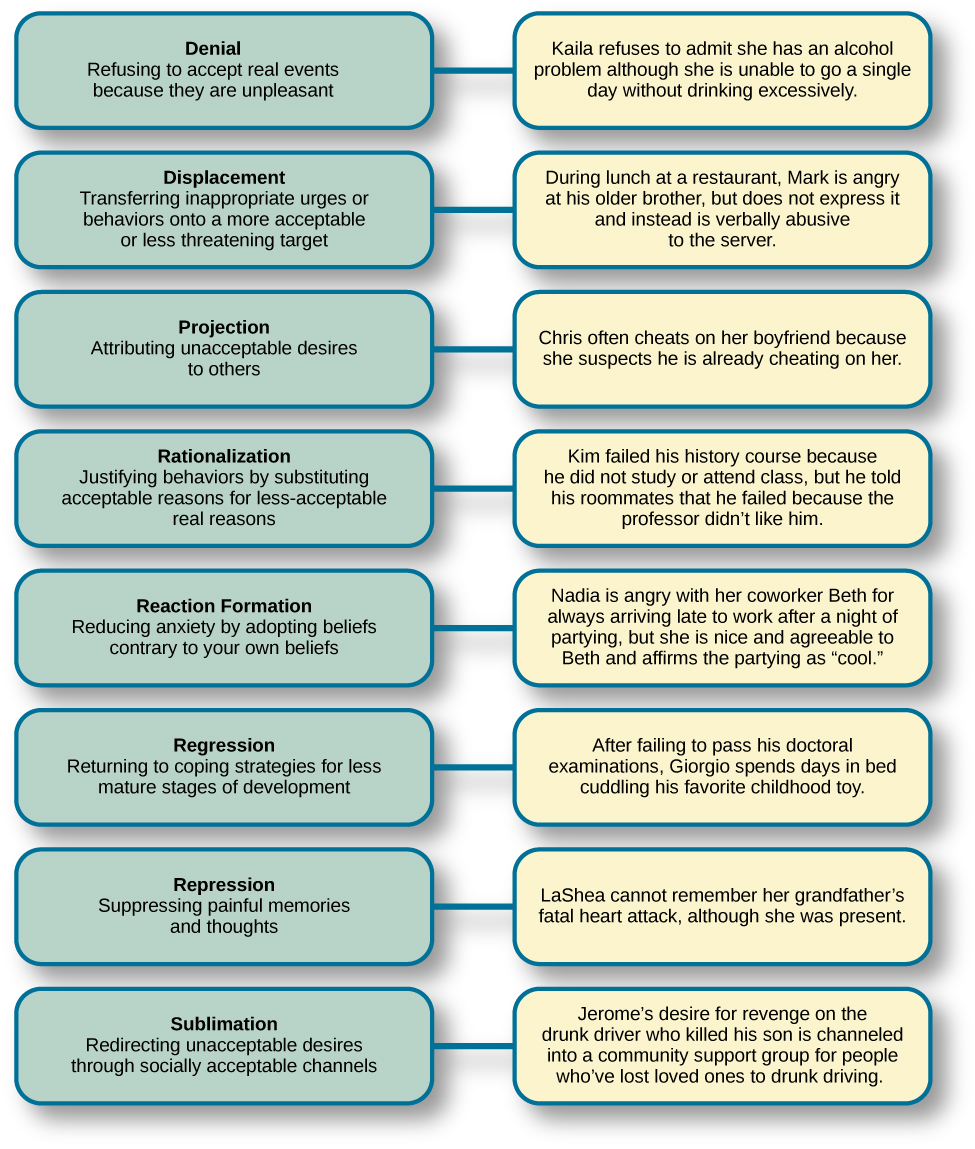| << Chapter < Page | Chapter >> Page > |
Freud believed that feelings of anxiety result from the ego’s inability to mediate the conflict between the id and superego. When this happens, Freud believed that the ego seeks to restore balance through various protective measures known as defense mechanisms ( [link] ). When certain events, feelings, or yearnings cause an individual anxiety, the individual wishes to reduce that anxiety. To do that, the individual’s unconscious mind uses ego defense mechanisms , unconscious protective behaviors that aim to reduce anxiety. The ego, usually conscious, resorts to unconscious strivings to protect the ego from being overwhelmed by anxiety. When we use defense mechanisms, we are unaware that we are using them. Further, they operate in various ways that distort reality. According to Freud, we all use ego defense mechanisms.

While everyone uses defense mechanisms, Freud believed that overuse of them may be problematic. For example, let’s say Joe Smith is a high school football player. Deep down, Joe feels sexually attracted to males. His conscious belief is that being gay is immoral and that if he were gay, his family would disown him and he would be ostracized by his peers. Therefore, there is a conflict between his conscious beliefs (being gay is wrong and will result in being ostracized) and his unconscious urges (attraction to males). The idea that he might be gay causes Joe to have feelings of anxiety. How can he decrease his anxiety? Joe may find himself acting very “macho,” making gay jokes, and picking on a school peer who is gay. This way, Joe’s unconscious impulses are further submerged.
There are several different types of defense mechanisms. For instance, in repression, anxiety-causing memories from consciousness are blocked. As an analogy, let’s say your car is making a strange noise, but because you do not have the money to get it fixed, you just turn up the radio so that you no longer hear the strange noise. Eventually you forget about it. Similarly, in the human psyche, if a memory is too overwhelming to deal with, it might be repressed and thus removed from conscious awareness (Freud, 1920). This repressed memory might cause symptoms in other areas.
Another defense mechanism is reaction formation , in which someone expresses feelings, thoughts, and behaviors opposite to their inclinations. In the above example, Joe made fun of a homosexual peer while himself being attracted to males. In regression , an individual acts much younger than their age. For example, a four-year-old child who resents the arrival of a newborn sibling may act like a baby and revert to drinking out of a bottle. In projection , a person refuses to acknowledge her own unconscious feelings and instead sees those feelings in someone else. Other defense mechanisms include rationalization , displacement , and sublimation .
Freud believed that personality develops during early childhood: Childhood experiences shape our personalities as well as our behavior as adults. He asserted that we develop via a series of stages during childhood. Each of us must pass through these childhood stages, and if we do not have the proper nurturing and parenting during a stage, we will be stuck, or fixated, in that stage, even as adults.

Notification Switch
Would you like to follow the 'Chapter 12: personality sw' conversation and receive update notifications?